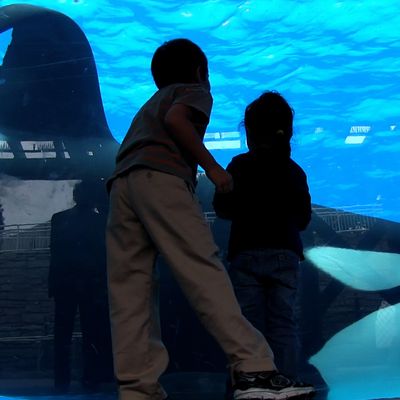
The hauntingly brutal nonfiction film Blackfish focuses on those leaping, frolicking, seemingly happy-go-lucky (even dolphin-esque) whales in captivity in places like SeaWorld, where every so often they’ll crunch down on a foot or arm and drag someone under until he or she drowns. And then you glimpse something wrong — something monstrous and unnatural — in this picture. And once you do, you won’t be the same.
The film begins in 2010, when esteemed 40-year-old trainer Dawn Brancheau was killed by a whale named Tilikum before a horrified Orlando SeaWorld crowd. The incident was generally viewed as a freak accident. The first wave of reports said that Brancheau had slipped and fallen into the water, the next (the version SeaWorld still stands by) that Tilikum had gone for Brancheau’s inappropriately dangling ponytail.
But this was — by all credible accounts — a savage attack. Tilikum had killed before, once at a place called SeaLand in Vancouver, once (possibly) at SeaWorld in Orlando. (The problem is that no one could prove what had actually happened to a disturbed man who’d snuck into SeaWorld after hours and was found in the morning on Tilikum’s back, naked and dead.) The big fella remains at SeaWorld, by most definitions psychotic but a source of million-dollar sperm to make more orcas for more lucrative fish shows. What’s an aquatic theme park without a killer whale?
This is one of those docs during which audiences gasp and cry out — or just cry — at regular intervals. Sometimes we cry for the humans, sometimes for the whales. After the prologue that alludes to Brancheau’s fate (we must wait more than an hour to hear the full story), director Gabriella Cowperthwaite cuts to a burly, bushy old guy who took part in a 1970 expedition to steal baby whales from their mothers to supply the burgeoning fish-show industry. The man is an ex-mercenary who claims to have toppled presidents. But what he can’t forget are those whales.
Orcas, you see, don’t part so easily with their children. Cowperthwaite animates what happened while a researcher narrates. The males attempted to divert the human predators while the females and children swam the other way. A brilliant diversion — spoiled by a spotter plane that relayed the whereabouts of mothers and children.
Whales are complicated, intelligent, highly emotional beings. They stick by their mothers for life in family pods. A mother who loses a child will make the kind of sound that transcends species. You hear that sound in Blackfish. You will never forget it.
Tilikum was one of those young ones snatched from his mother.
Former Orlando SeaWorld trainers recall the anguish of mothers losing children (SeaWorld would ship babies to other parks), the excruciating solitary confinement of orcas like Tilikum, and even how males’ dorsal fins, erect in the wild, would sadly go limp and curl over in captivity.
Those ex-trainers are riveting subjects, chiseled and eloquent. And traumatized. Editor Eli Espres will cut back and forth from their tearful recollections to footage of their younger selves, smiling and spouting their insipidly hearty SeaWorld spiels. I loved listening to curly-haired Samantha Berg (now living at the opposite end of the U.S. — in Alaska), Dean Gummersall (especially cretinous as a SeaWorld spokesman in his early days, now appropriately and likably embarrassed), John Jett, and especially the weathered, sardonic Dr. David Duffus. But I shouldn’t single anyone out—they’re all compelling. They all came to love those whales, even Tilikum, driven mad by isolation and regular attacks by the tag-team torture of formidable mama whales. There was no place else for him to swim.
The movie unfolds like a thriller. We see trainers seconds away from their deaths — which are not, mercifully, shown. But the near-deaths are shown and are awful enough. Top trainer Ken Edwards is repeatedly pulled under by a whale (not Tilikum) that will not let him go. It went on for twelve agonizing minutes.
SeaWorld officials declined to be interviewed for Blackfish, but there are transcripts from an OSHA hearing (wittily animated) suggesting that the company’s Kelly Clark lied about her connection to a park in Spain’s Canary Islands where a young trainer was torn apart. The whales came from SeaWorld.
For the record, SeaWorld has sent a letter to critics calling the movie’s allegations “inaccurate and misleading.” In the space of a minute, I’d spotted two places in which it totally mischaracterized the information in Blackfish and one in which it contradicted several of its employees (who were filmed surreptitiously spouting the company line). SeaWorld conceded nothing, nada — I’m surprised it didn’t dispute the movie’s 83-minute running time. Writer David Kirby, who isn’t in the film but wrote a book called Death at SeaWorld, issued a point-by-point refutation and called the letter “one of the clumsiest, most ill-advised acts of corporate crisis-management in decades … Think New Coke.”
Blackfish doesn’t get into the subject of dolphins in captivity. That’s another can of fish. But you can extrapolate. It would be heartening beyond words if all cetaceans were someday gone from parks like SeaWorld. But that won’t happen without a hell of a fight. And trainers who go on record decrying what they’ve seen will likely be blackballed.
It’s true that the number of whales in captivity isn’t huge. But they’ve now become the mightiest symbols of our cultural hubris — of our inability to manage creatures we have the power to capture and imprison. It’s a metaphor for the ages.


